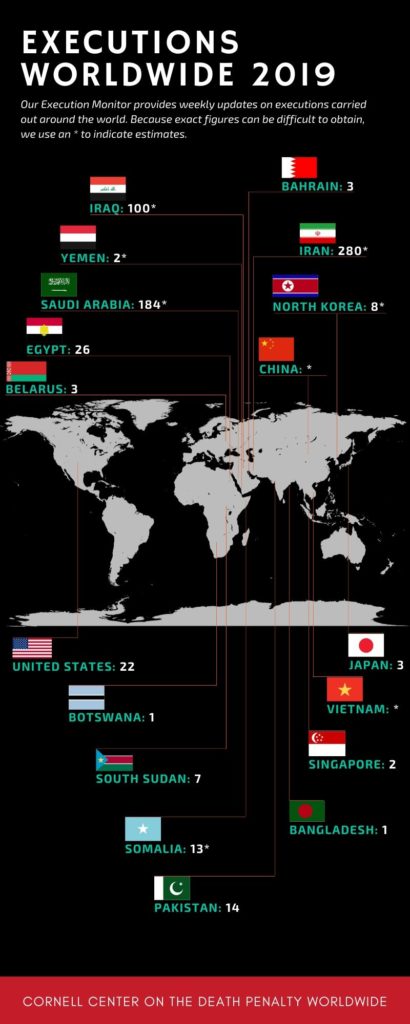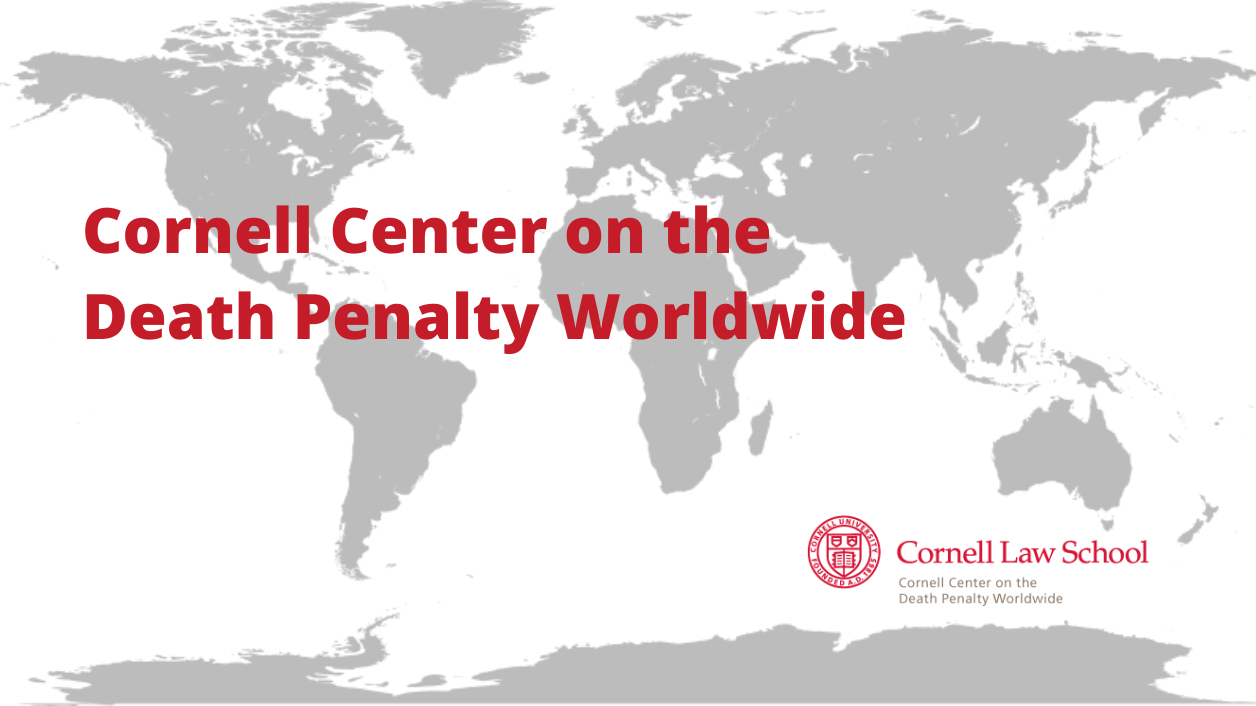The Death Penalty in 2019: Declining Use of Death Penalty Worldwide
Executions in 2019

Executions Worldwide 2019 – Cornell Center on the Death Penalty Worldwide
In 2019 the Center documented 18 countries that carried out executions —the lowest number since 2009.1 This figure includes Vietnam, which often carries out secret executions not reported in the media or in other available sources.
Regionally, Asia carried out the most executions in 2019. In Western Asia, Iran had the highest number of executions, with at least 280 reported executions.2 Of the people who were executed, at least 9 were under the age of 18 and at least 17 were women. Saudi Arabia executed at least 184 people last year, marking the highest number of executions in that country over the 13 years we have been tracking executions. Iraq executed at least 100 people, and Bahrain and Yemen executed at least 3 and 2 people respectively.
In the rest of Asia, we estimate China carried out at least 2,000 executions in 2019, more executions than any other country and perhaps more executions than the rest of the world combined. It is difficult to estimate the number of executions in China as this number is a state secret, and it is possible that the number far exceeds 2,000. We base our estimate on the number of executions Dui Hua reported last year, and we assume that a similar number of executions may have been carried out in 2019. We also lack information about executions in Vietnam in 2019. We did not find reports of any executions and Vietnam maintains that such information is a state secret. Last year, Vietnam gave the world a rare glimpse of official data revealing that it had carried out at least 85 executions in 2018. We believe it is unlikely the country ceased executions in 2019, and much more likely that the numbers are consistent with those reported in 2018. We also do not know precisely how many executions took place in North Korea, where executions are also a state secret. We found reports of at least 8 executions in North Korea in 2019. Japan executed 3 people, one of whom was the first foreign national to be executed in a decade in Japan. Pakistan carried out 14 executions, Singapore carried out 2, and Bangladesh carried out 1.
Many countries in Africa are now abolitionist de facto, meaning that they have not carried out an execution in over 10 years. Botswana was the only country in Southern Africa to carry out an execution in 2019, defying the regional trend towards abolition of the death penalty. In Northern Africa, Egypt carried out 26 executions, and South Sudan carried out 7 executions. In Eastern Africa, Somalia executed at least 13 people, including the execution of 5 men in Somalia’s semi-autonomous region Puntland .
In the Americas, Saint Kitts and Nevis became abolitionist de facto, having not carried out an execution since 2008. The United States is now the only country in the Americas that has carried out any executions in the past 10 years. In 2019 it carried out 22 executions.
Belarus is still the only country to apply the death penalty in Europe, and carried out at least 2 executions in 2019. It is likely that a third person in Belarus was also executed, as he was a co-defendant of one of the men whose execution was reported and Belarus typically executes co-defendants at the same time.
Other Death Penalty Trends in 2019
In 2019, we published updated country reports on death penalty laws and practices in Zimbabwe, Papua New Guinea, the United States, and Mauritania .
Brunei declared a moratorium on executions in May 2019, after international outcry on its planned implementation of penal code provisions stipulating stoning as a method of execution for same-sex relations. In the United States, New Hampshire became the 21st state to abolish capital punishment, marking the first time that half of all states either have abolished the death penalty or have gubernatorial moratoriums in place. (Colorado followed on March 23, 2020, becoming the 22nd state to abolish capital punishment in the United States.)
In a small number of states, we observed an expansion of the death penalty for certain offenses such as drug offenses and kidnapping. Notably, Egypt and Bangladesh passed legislation expanding the application of capital punishment for drug-related offenses. In Nigeria, a bill was introduced to replace a sentence of 10 years with the death penalty for kidnapping (this bill was passed into law on March 10, 2020). India also introduced the Anti-Maritime Piracy Bill in Lok Sabha on December 9, 2019, which provides for the death penalty for piracy, although it has not been reported whether the bill has passed.
Sri Lanka’s former President Sirisena effectively lifted its moratorium on the death penalty by signing death warrants of four individuals convicted of drug trafficking, though the Supreme Court of Sri Lanka stayed the executions. We have found no information indicating whether those executions will be rescheduled.
Conclusion
Our data reveals that an increasing number of countries are moving away from the use of the death penalty. This is particularly true in Sub-Saharan Africa, where only three countries carried out executions in 2019. Nevertheless, a minority of countries have expanded the scope of capital offenses in the context of drug offenses and kidnapping offenses. Overall, the death penalty is an increasingly unpopular punishment worldwide.
1 We collect data through communication with in-country partners, regular reports from human rights organizations (notably Iran and Pakistan), and weekly monitoring of news reports on executions worldwide.
2 The updated execution number for Iran is not yet reflected in the individual country report. We are in the process of redesigning our database, and we thank you for your patience during our transition.
